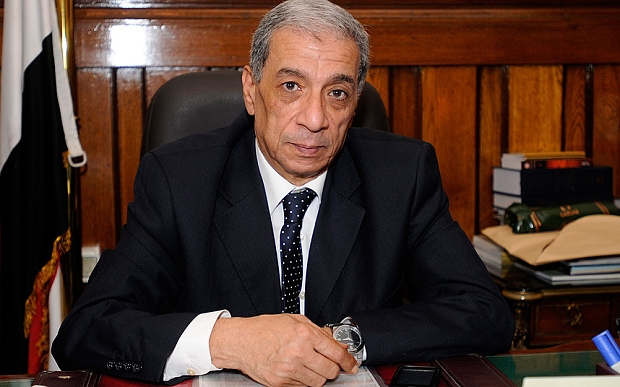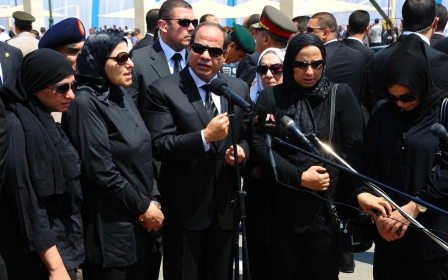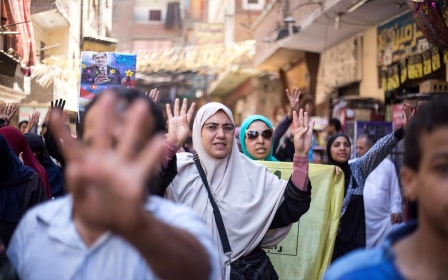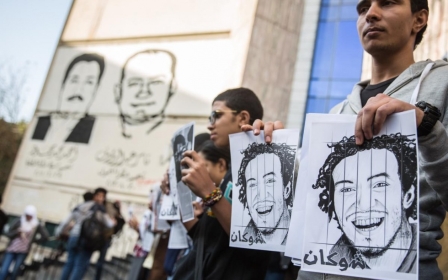ANALYSIS: Attack on Barakat exposes vulnerability of Egypt’s judiciary

The assassination of Egypt's prosecutor-general on Monday marks a major escalation in attacks against a judiciary that has played a leading role in the crackdown on political opposition to the government of Abdel Fattah al-Sisi.
Emad Shahin, an Egyptian professor sentenced to death in absentia in the same trial as former Egyptian president Mohamed Morsi, told Middle East Eye that the country’s judiciary are likely to be targets in any new wave of attacks.
“The judiciary has been part of the bloody confrontation between the regime and its opponents,” he said by phone from Washington.
“There has been a travesty of justice and a neglect of due process,” he said, pointing to a series of leaks that claimed to expose collusion between the judiciary and officials close to then army chief, now president, Abdel Fattah al-Sisi.
One of the leaked recordings, broadcast by opposition news channels and recently verified by UK audio forensics experts, alleged that the target of Monday's bomb attack, Prosecutor-General Hisham Barakat, had colluded with officials to fabricate details about Morsi’s detention following his military ousting.
Barakat denied the leaks were authentic, alleging that they had been falsified by the Muslim Brotherhood.
Key targets
According to Shahin, the judiciary’s role in the state’s crackdown on dissent means some view judges, courts and prosecutors as key targets for radical elements of the opposition.
Militants on Monday published a video claiming to show an operation codenamed “Purifying the Judiciary,” featuring slow-motion footage of a machine-gun attack targeting Egyptian judges on a busy road.
Gunmen from Ansar Beit al-Maqdis, which recently pledged allegiance to Islamic State and changed its name to Sinai Province, opened fire on a car in the restive Sinai Peninsula in May, killing two judges, a prosecutor and their driver.
In March, the Supreme Court in Cairo, where Barakat had his offices, was targeted by a bomb blast.
In the wake of that attack, which left two people dead, Barakat promised to speed up the implementation of a new Terrorist Entities bill announced in February.
Human rights groups - who warned that the law allows political parties to be defined as terrorist organisations “with ease” - greeted the bill with alarm.
Spiralling militancy and government legitimacy
In the absence of a functioning parliament, the current government, led by President Sisi, has secured much of its legitimacy by pledging to crack down on militancy.
In the midst of rising violence, though, some have questioned whether the success of such a large attack will reflect badly on his efforts so far to stamp out violence, especially an ongoing insurgency in the Sinai.
“Sisi’s raison d’etre is fighting terrorism and restoring stability,” Shahin said. “So far he has failed miserably to achieve this. He hasn’t been able to restore security, and nor has he offered any way to ease the situation.”
Despite this, analysts doubt that this latest bold attack will force a rethink from authorities in Cairo.
“This will not embarrass [President Sisi],” said Issandr el-Amrani of the International Crisis Group. “On the contrary, the reaction from the public and the international community will help Sisi. He says he’s fighting a war on terror, and this is a terrorist attack. It will make it harder to put pressure on the regime to stop using such harsh repression as part of its security efforts.”
Activists in Egypt and those in exile say that, in the wake of Barakat’s murder, they fear an escalation in the government’s attempts to put down opposition, whether by violent or peaceful means.
“This is exactly what the regime wants - they will use it as an excuse to tighten their grip,” warned Shahin. “It will lead Egypt into a vicious cycle of endless violence."
Middle East Eye propose une couverture et une analyse indépendantes et incomparables du Moyen-Orient, de l’Afrique du Nord et d’autres régions du monde. Pour en savoir plus sur la reprise de ce contenu et les frais qui s’appliquent, veuillez remplir ce formulaire [en anglais]. Pour en savoir plus sur MEE, cliquez ici [en anglais].




